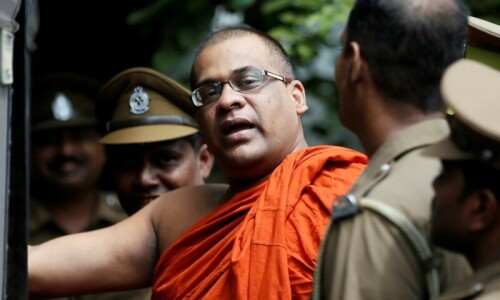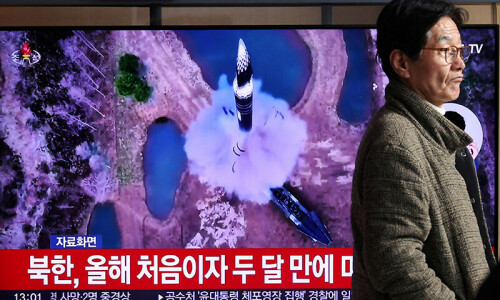WITH the self-styled Islamic State now in control of the ancient city of Palmyra in Syria, the world awaits the inevitable videos of priceless ancient monuments and artefacts being destroyed by barbarians. After all, they have demonstrated their hatred for beauty and history by smashing the stunning statues and friezes that had defied centuries of solitude and sand at the Iraqi site of Nineveh.
In its mania for pulling down mankind’s heritage, the IS is not alone. When the Taliban swept into Kabul in 1996, its wonderful museum — already damaged during the civil war — was denuded of most of its displays. Luckily, the dedicated museum staff had hidden many objects, but much was destroyed and looted.
Also read: IS cements grip on Iraq-Syria border
The Taliban went on to complete their own isolation when they blew up the giant statues of Buddha at Bamiyan, despite pleas and protests from around the world. They showed themselves to be devoid of any sensitivity or respect for other faiths and cultures by their brutal acts of iconoclasm.
Their actions were imitated by their Pakistani cousins, although mercifully not on the same scale. Many Buddhist stone carvings have been defaced and destroyed in our northern areas ever since jihadi militants went on a rampage.
Much of this mindless destruction of old and valuable sites found an echo in distant Mali where Tuareg tribesmen and Islamic militants recently tore down ancient shrines and burned centuries-old manuscripts collected by Muslim scholars in Timbuktu when the city was a centre of Islamic studies hundreds of years ago.
So why are extremists hell bent on destroying ancient sculptures and buildings, and burning old manuscripts? For an answer, look no further than Saudi Arabia. According to the London-based Islamic Heritage Research Foundation, 98pc of the kingdom’s historical and religious sites have been destroyed since 1985. Shrines, tombs and even the houses of the earliest Muslims have not been spared this deliberate carnage.
Dogmatic Saudi followers of the Wahabi offshoot of Islam believe that shrines and graves can become places of worship, and must therefore be destroyed. And if relics of the past that were linked to Islam’s earliest adherents are destroyed, what chance do the statues at Palmyra and Nineveh have?
And yet, this was not always so in regions governed by Muslims in the past. For instance, although Palmyra shows signs of habitation dating back to 7500BC, it has been under continuous Muslim control since AD634. And yet, before the appearance of the savage IS, its ancient sites were never at risk. Clearly, the Saudi example has inspired extremists from Afghanistan to Mali to take explosives, hammers and pickaxes to all that’s old and precious.
This extensive destruction of ancient sites and artefacts provides ammunition to many in the West who have long argued that it is legitimate for old colonial powers to retain the priceless art objects and archaeological treasures they have collected from around the world, and now display in their museums. This debate was sparked off by the long outstanding demand from the Greeks for the return of the Elgin marbles taken from Athens over a hundred years ago, and now displayed at the British Museum in London.
The Indian government, too, has asked for the return of the Koh-i-Noor diamond that now forms part of the royal jewellery collection. Similarly, other countries have demanded that objects from their history be restored. Worse than colonial powers have been the private collectors who have transported immense quantities of art and artefacts from across the globe. People who have watched the Indiana Jones movies will know the lengths to which collectors will go.
Pakistan has suffered a massive loss of its archaeological treasures, especially of carvings from the Gandhara period. Unscrupulous dealers employ armed gangs to dig up unexcavated sites, and smuggle artefacts abroad. This illicit trade makes the news once in a while when some of the objects are stopped at airports, but many more make their way to private collectors from Tokyo to New York.
Given the insecurity and violence currently gripping so many ancient centres of civilisation that now fall in the Islamic world, there is an argument that these countries cannot care for the ancient treasures that have been uncovered there. It is better, these conservationists say, that as many of these objects as possible be displayed in safer places.
After all, this argument runs, these treasures belong to all mankind, and should be accessible and properly looked after. Given the madness currently gripping much of the Muslim world, it is hard to counter this line of thinking. Years ago, I was told by the director-general of Pakistan’s archaeology department that many identified Gandhara sites had not been uncovered as he could not safeguard them, and nor did our museums have the space to display the finds.
The bottom line is that poor Muslim countries don’t have the resources to build new museums, or expand the existing ones. Rich ones like Saudi Arabia are likely to destroy rather than display ancient treasures. Oman has invested in a museum of Islamic art, but it is a rare exception.
Sadly, we are silent on the subject of cultural and historical destruction of the kind practised by Saudi Arabia. After all, the shrines and resting places of early Muslims belong to all believers, and not just the Saudi royal family. Much of the ongoing destruction in Makkah and Madina is aimed to make room for hotels, car parks and public toilets.
If the ‘guardians of the holy places’ set such an example, it would be unrealistic to expect respect and sensitivity from the IS and the Taliban.
Published in Dawn, May 25th, 2015
On a mobile phone? Get the Dawn Mobile App: Apple Store | Google Play













































